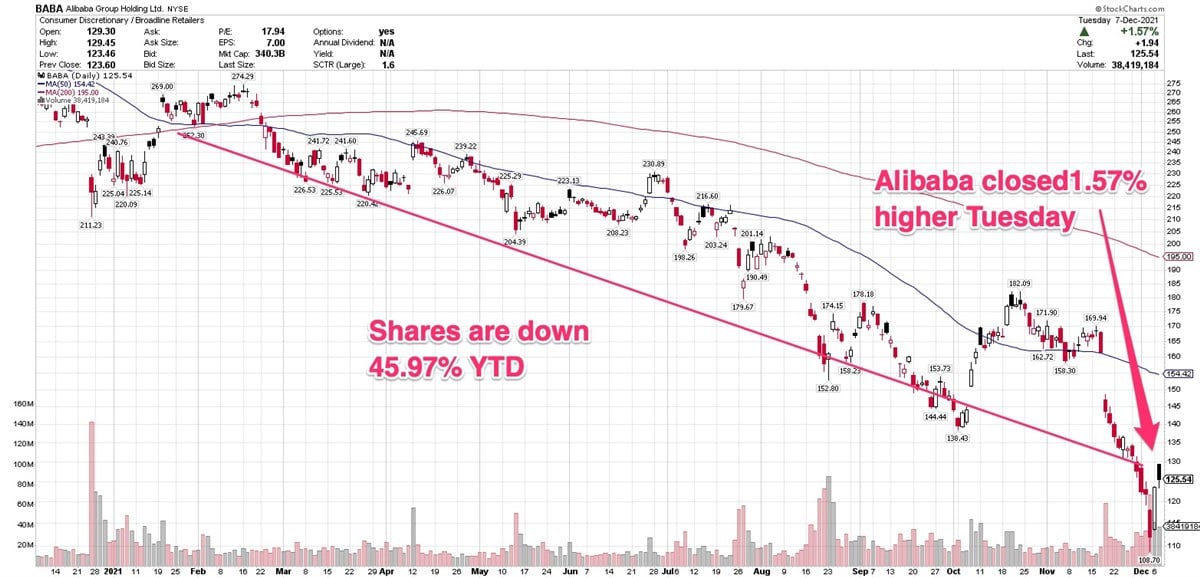Alibaba Advances 1.57% On News Of Business Unit Reorganizations
Shares of China-based online marketplace Alibaba Group (NYSE: BABA) are up more than 11% so far this week, marking the stock’s best performance since early October.

This story originally appeared on MarketBeat
Shares of China-based online marketplace Alibaba Group (NYSE: BABA) are up more than 11% so far this week, marking the stock’s best performance since early October.
Shares are down 45.97% year-to-date. The stock closed at $125.54 Tuesday, up $1.94, or 1.57%.
The uptick follows news that Alibaba named Toby Xu to the post of chief financial officer, replacing Maggie Wu, who steps down in April. Xu has been the company’s deputy CFO.
Wu will continue in her roles with the Alibaba Partnership and on the Alibaba board.
Alibaba is reassigning roles to four of its executives in one of the biggest reshuffles in its recent history, the company announced on Monday morning.
Investors tend to reward companies for well-defined succession plans if the successor appears likely to help drive the company’s growth.
That’s of special concern as Alibaba has struggled for more than a year. The start of the decline roughly coincided with the three-month disappearance of Alibaba founder Jack Ma.
Ant Crawls Into Trouble
In October of last year, digital financial services company Ant Group, founded by Ma, was about to go public, expected to raise $34.5 billion, which would have made it the largest IPO at the time. However, the Chinese government put the kibosh on the transaction.
Before the planned IPO, Ma made public comments critical of China’s financial system.
The company’s troubles didn’t end there. Earlier this year, Beijing began cracking down on tech companies, investigating monopolistic practices and the security of data.
Global investors are viewing the executive shuffles at the $343 billion market cap company as a breath of fresh air, signaling that Alibaba is taking steps to reverse the recent downturns, both in the stock price and in the company’s reputation.
Net income, too, has suffered.
Alibaba saw a 34% decline in earnings in the most recent quarter. That coincided with deceleration in revenue growth in the past two quarters, from 77% to 36%.
In the statement about the personnel shifts, Wu said, “The announcement of Alibaba’s CFO transition today is the culmination of extensive preparation over many years and a part of Alibaba’s leadership succession planning.”
In remarks clearly designed to reassure investors, Wu added, “The markets will always have ups and downs, but Alibaba has ambitious long-term goals. We are in a relay race and we must have new generations of talent to take the company forward. I trust Toby even more than I trusted myself when I first took up the CFO position years ago.”
Reorganizing Business Units
In addition to the CFO succession plans, Alibaba rolled out a reorganization to the international and domestic arms of its e-commerce business. In essence, the company is splitting its domestic and international units. The aim is to make the company more nimble to aid in growth, not always easy in such a big, established company.
Alibaba hopes to reach a billion annual active consumers in China by the middle of next year, and 2 billion internationally over the long haul.
“We will continue to focus on becoming a truly globalized company, and we believe that overseas markets present many exciting potential and opportunities for us to capture,” wrote Alibaba chairman and CEO Daniel Zhang in a statement.
It’s sometimes the case that a growth stock becomes a value play, and that may be happening with Alibaba.
Alibaba As A Value Stock?
In October, prior to the start of its decline, Alibaba’s price-to-earnings ratio stood at 25.77, in line with many growth stocks, whose P/E ratios indicate a degree of being “priced to perfection.”
Since then, the P/E ratio has steadily fallen and was 18.07 as of Tuesday. That lower P/E doesn’t mean the stock is setting up for bigger gains, but it could mean Alibaba is available at a bargain price, relative to its future potential.
The number of mutual funds owning shares of Alibaba declined from 3,876 in the quarter ended a year ago, to 2,717 in the quarter ended in September.
According to MarketBeat data on institutional ownership, institutional outflows in the past 12 months total $87.72 billion, while inflows total $34.51 billion.
Technically, the stock long ago undercut the structure low of its last base, and a new base with a continued uptrend could indicate that institutional investors are ready to jump back in after bailing out in the past year. Renewed institutional buying would send the stock higher, and offer retail investors a new entry point. 
Shares of China-based online marketplace Alibaba Group (NYSE: BABA) are up more than 11% so far this week, marking the stock’s best performance since early October.
Shares are down 45.97% year-to-date. The stock closed at $125.54 Tuesday, up $1.94, or 1.57%.
The uptick follows news that Alibaba named Toby Xu to the post of chief financial officer, replacing Maggie Wu, who steps down in April. Xu has been the company’s deputy CFO.





